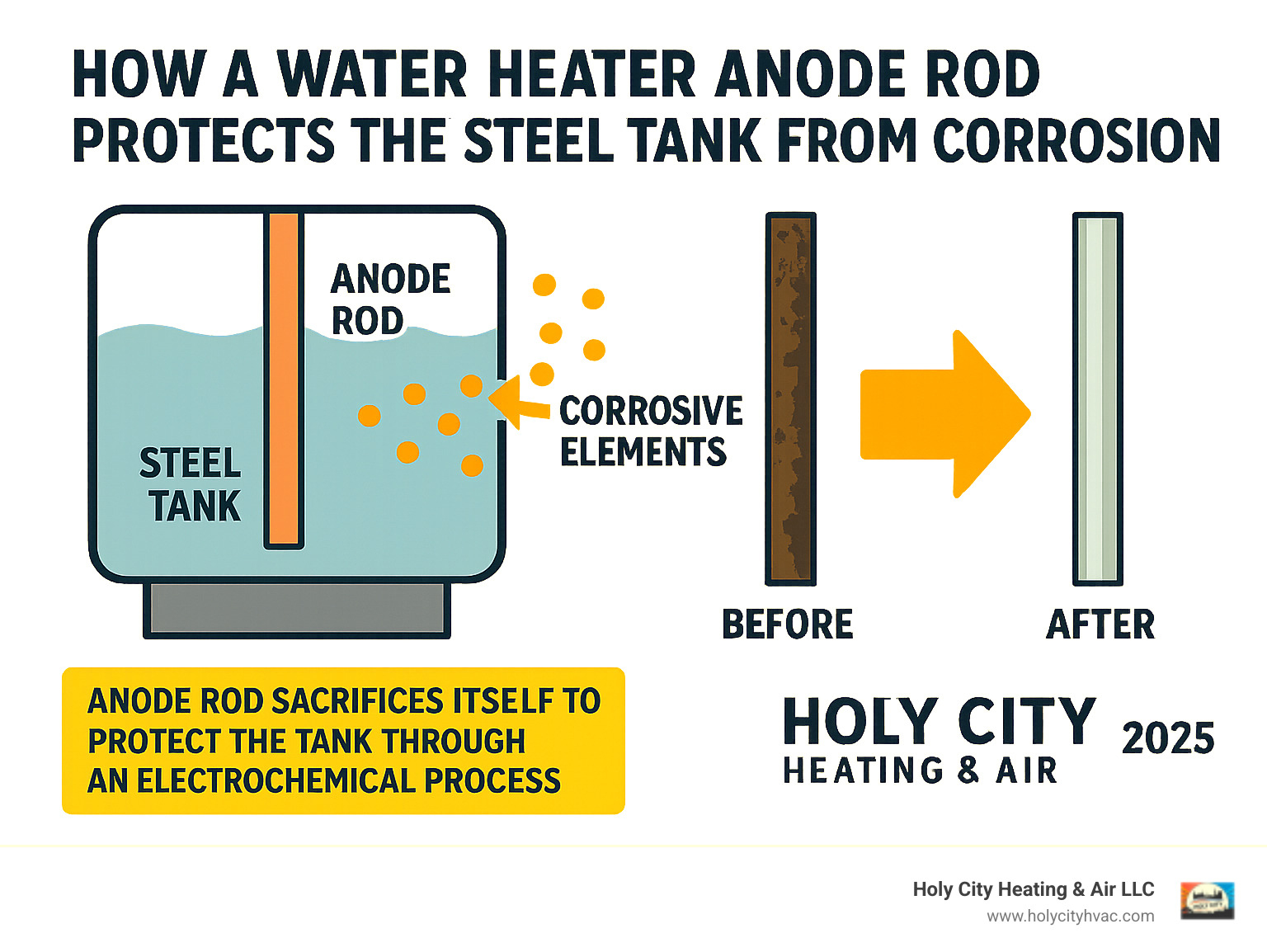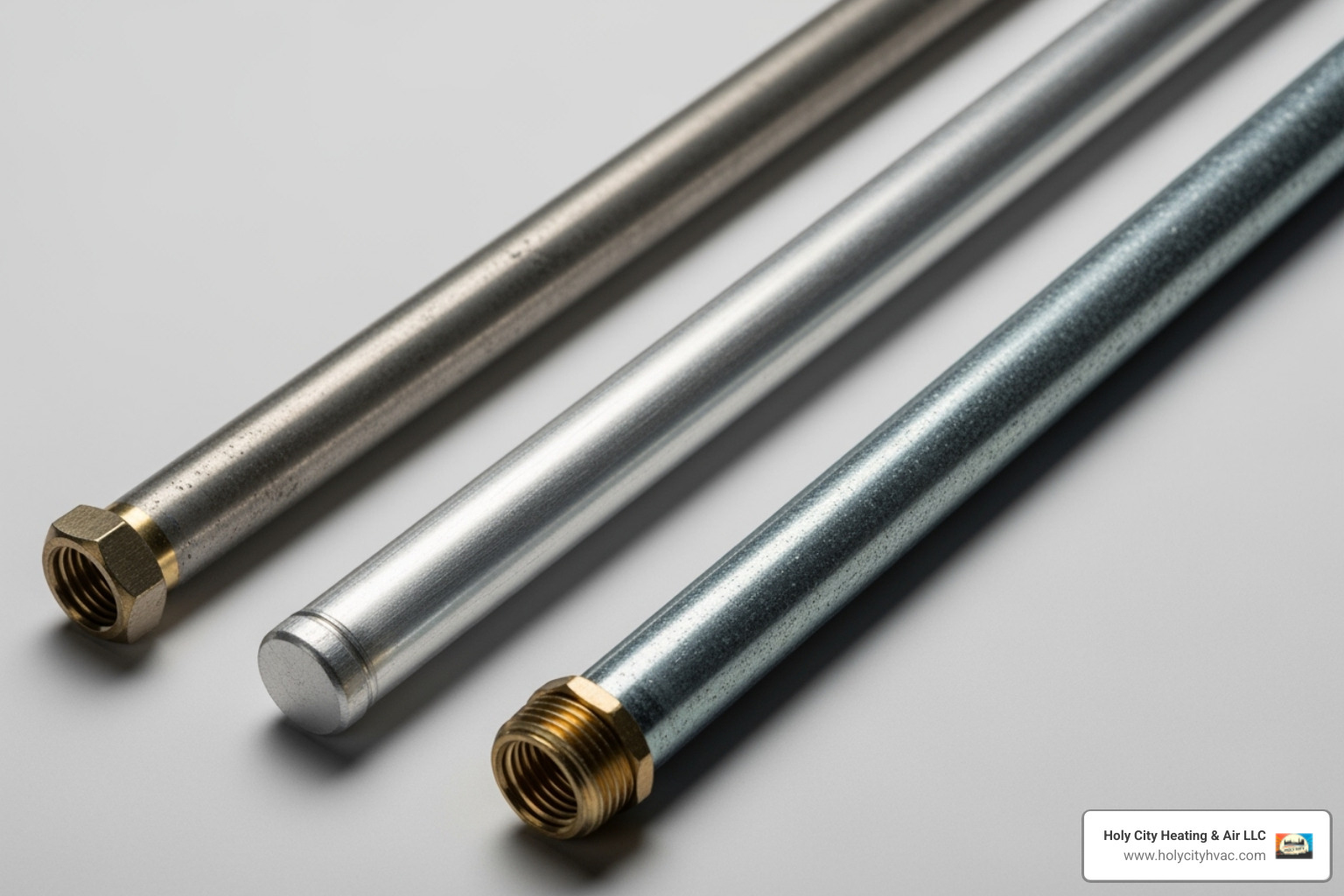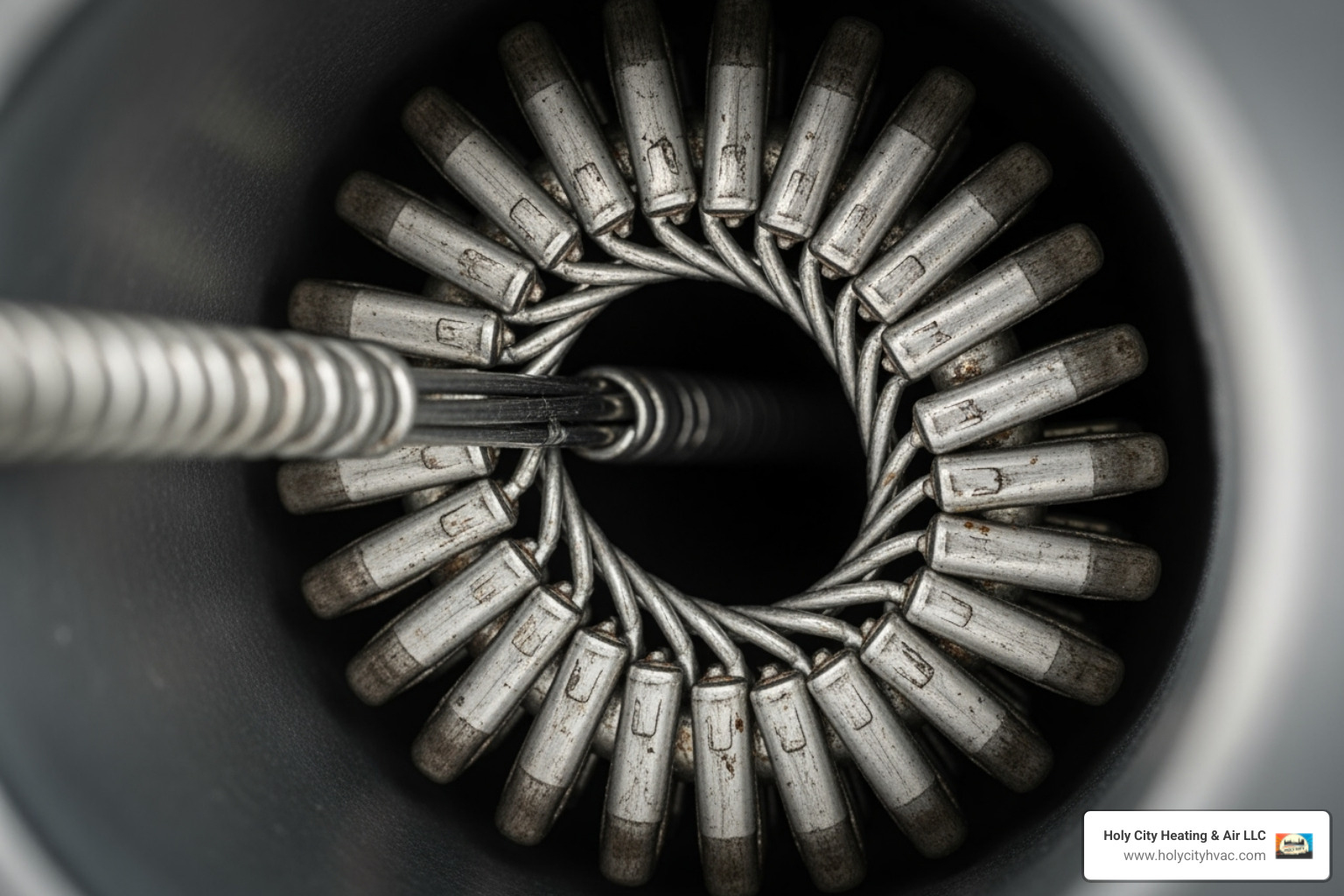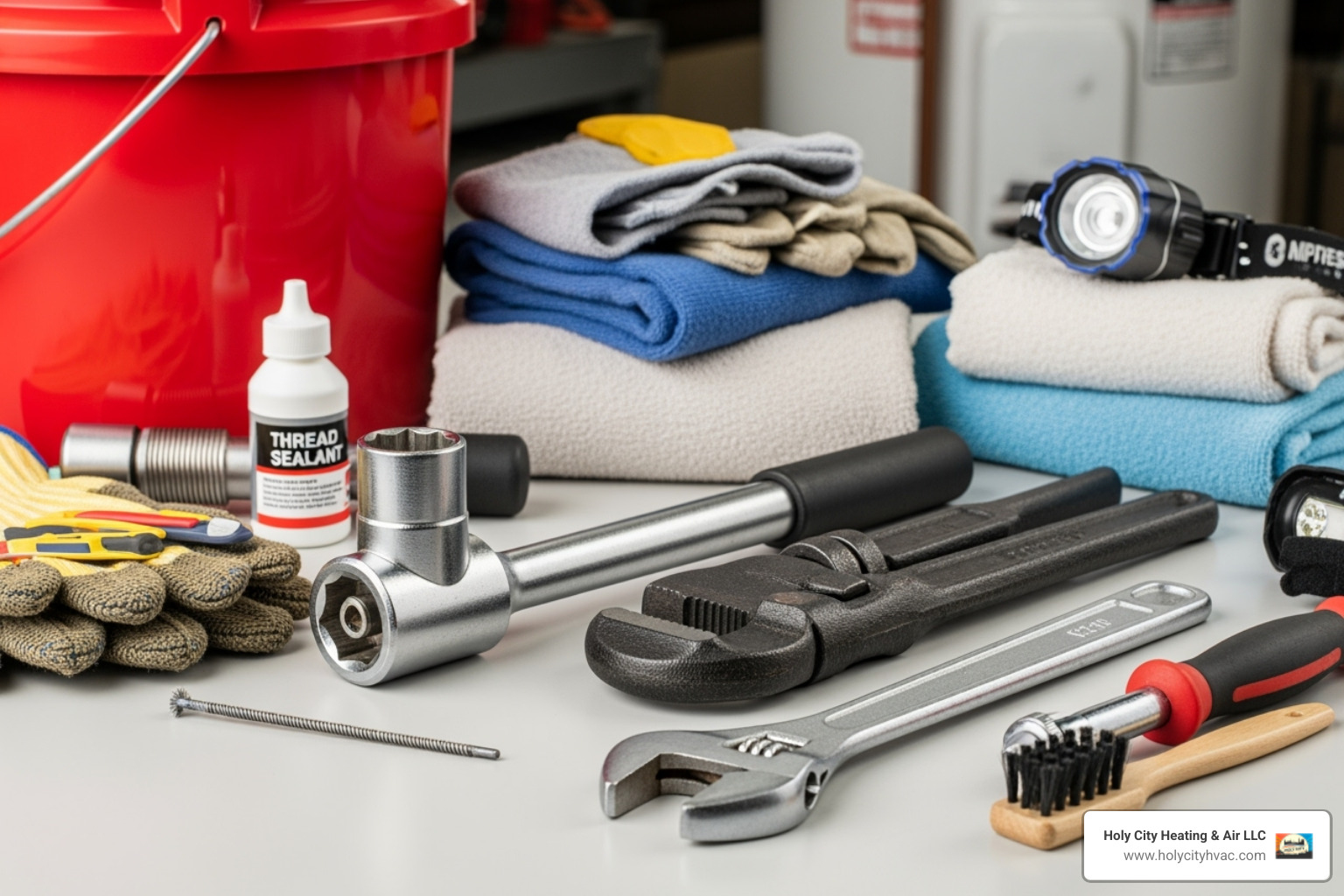
Why Your Water Heater Needs a Guardian Angel
A water heater anode rod is a sacrificial metal rod that protects your water heater tank from corrosion by attracting corrosive elements and minerals in the water, corroding itself instead of the steel tank. This "sacrificial" process can extend your water heater's lifespan from the typical 8-12 years to potentially 15+ years when properly maintained.
Quick Facts About Water Heater Anode Rods:
- Purpose: Prevent tank corrosion through sacrificial protection
- Materials: Magnesium, aluminum, or zinc-aluminum alloy
- Lifespan: 3-5 years typically, varies by water quality
- Inspection: Check every 1-3 years
- Replacement: When more than 50% consumed or steel wire exposed
- Cost: $20-$40 for standard rods, $200-$300 for powered versions
Picture this: you wake up one morning to a cold shower, only to find a puddle of rusty water around your water heater. This nightmare scenario affects thousands of Charleston homeowners every year - but it's often completely preventable.
Your water heater's anode rod works like a bodyguard for your tank. It sacrifices itself to protect the steel lining from rust and corrosion. Without this unsung hero, your tank would corrode from the inside out within just a few years.
The science is simple but brilliant. The anode rod is made of metals that are more reactive than steel - typically magnesium, aluminum, or zinc. When dissolved minerals and oxygen in your water start looking for metal to attack, they go after the anode rod first, leaving your expensive tank alone.
But here's what most homeowners don't know: anode rods don't last forever. They're designed to be consumed, and when they're gone, your tank becomes the target. That's why regular inspection and replacement is crucial for protecting your investment.

What is a Water Heater Anode Rod and How Does It Work?
A water heater anode rod is a long metal rod, typically made from magnesium, aluminum, or a zinc-aluminum blend, that sits inside your tank to protect it. It works by sacrificing itself. The rod is made of metals more reactive than the tank's steel walls, so corrosive elements in the water attack it first.
This process, called galvanic corrosion (or cathodic protection), draws corrosive particles away from the tank's lining and welds. Understanding the science behind anode rods shows why this part is vital for extending your water heater's life. Without a functioning anode rod, your tank is vulnerable to rust, making regular checks as important as watching for signs of sediment buildup in water heaters.
The Science of Sacrificial Protection
The science behind a water heater anode rod is clever chemistry. When two different metals are placed in water (an electrolyte), they form an electrical circuit. In this electrochemical process, the more reactive, or "less noble," metal corrodes first. The anode rod is intentionally made from a metal more reactive than the tank's steel.
As the rod slowly dissolves, it attracts corrosive ions that would otherwise attack the steel tank and its vulnerable welds. This passive, sacrificial protection works 24/7 to prevent rust and extend your appliance's life.
The Impact of Water Quality
The quality of your Charleston area water directly impacts how quickly your water heater anode rod is consumed.
Hard water is high in minerals like calcium and magnesium. This can lead to sediment buildup but sometimes forms a protective scale that slows corrosion.
Softened water is more conductive because minerals are removed, making it more aggressive toward metals. This accelerates the electrochemical process, consuming the anode rod up to three times faster.
Well water and city water have different effects. Well water can contain minerals and bacteria that react with the anode rod, sometimes causing a rotten egg smell. City water contains chlorine and other chemicals that also influence anode rod performance.
Understanding your water quality helps you plan maintenance. With soft or well water, check your anode rod more frequently as part of your annual water heater maintenance routine.
Types of Anode Rods and How to Choose the Right One
Not all water heater anode rods are created equal. Choosing the right one depends on your specific situation and water chemistry. The rod's material affects its performance in hard or soft water, and some are designed specifically to combat the rotten egg smell in hot water. Let's break down the options to help you choose the best one for your Charleston home.

Let's break down your options so you can make the best choice for your Charleston home's water heater.
Magnesium, Aluminum, and Zinc-Aluminum Rods
Each type of sacrificial anode rod has its own personality, if you will. Here's how they stack up:
| Anode Rod Type | Best For (Water Type) | Lifespan | Pros | Cons |
|---|---|---|---|---|
| Magnesium | Soft water, general use | Shorter (3-5 years) | Provides excellent protection, highly reactive, good for soft water where other rods may be less effective. Many consider it the best for overall tank protection. | Consumes faster, may react with sulfates in water to produce a "rotten egg" smell. Can create more sediment. |
| Aluminum | Hard water, general use | Longer (5+ years) | More durable, lasts longer than magnesium rods, often more cost-effective. | Less reactive than magnesium, may not provide as robust protection in some conditions. Can swell when eroded, making removal difficult. Sediment can be a potential health hazard if consumed. |
| Zinc-Aluminum | Water with sulfur/odor issues | Medium (4-6 years) | A blend of aluminum (for lifespan) and zinc (to combat odors). Zinc helps neutralize sulfur-reducing bacteria that cause a rotten egg smell. | Not as universally protective as magnesium for all water types. Still corrodes and needs replacement. |
Magnesium rods are highly reactive, providing excellent protection, especially in soft water, but they are consumed faster. They can worsen a rotten egg smell if your water contains sulfur bacteria.
Aluminum rods last longer, making them a popular choice for hard water. They are more budget-friendly but can swell when corroded, making removal difficult.
Zinc-aluminum rods are problem-solvers for smelly hot water. These blended rods use zinc to neutralize sulfur-reducing bacteria while providing solid tank protection.
Powered Anode Rods: The Modern Alternative
What if I told you there's a water heater anode rod that doesn't slowly dissolve away and can last over 20 years? Enter the powered anode rod - the Tesla of water heater protection.
These high-tech rods use a titanium core and a small electrical current to provide continuous protection without sacrificing themselves. It's like having a force field around your tank instead of a bodyguard who eventually gets worn down.
The benefits are pretty impressive. First, there's the longevity - we're talking decades, not years. Second, they're odor-eliminating superstars, often clearing up that rotten egg smell within hours of installation. The electrical current also helps reduce limescale buildup, keeping your tank cleaner overall.
They provide consistent, reliable protection regardless of your water type, automatically adapting to city or well water conditions. The electricity they use is minimal - about what a small nightlight would consume over a year.
The main drawback? The upfront investment is significantly higher than traditional rods. But for homeowners who want a "set it and forget it" solution, especially those dealing with odor issues, powered anode rods can be worth every penny. It's similar to how Benefits of Installing Tankless Water Heaters offer long-term advantages despite higher initial costs.
Flexible Anode Rods for Tight Spaces
Here's a scenario we encounter all the time: a homeowner needs their water heater anode rod replaced, but their water heater is crammed into a closet with barely enough headroom to change a light bulb, let alone maneuver a three-foot-long rigid rod.
That's where flexible anode rods save the day! These clever inventions look like a metal chain made of magnesium or aluminum segments connected by steel wire. You can bend them, twist them, and thread them into spaces where a solid rod would be impossible to install.

The segmented design is genius - it provides the same sacrificial protection as a rigid rod but with infinitely better installation ease. Whether you're tackling a DIY project or our team is handling Water Heater Installation Charleston SC in a tight spot, flexible rods can turn an impossible job into a manageable one.
They're particularly popular in manufactured homes, condos, and older Charleston houses where water heaters were squeezed into spaces that weren't really designed for easy maintenance access.
Inspection, Maintenance, and Replacement Schedule
Think of your water heater anode rod as the smoke detector of your hot water system - it's doing its job silently in the background, but you need to check on it regularly to make sure it's still working. Regular inspection and timely replacement aren't just good ideas; they're essential preventative maintenance that can save you thousands of dollars in water damage and premature water heater replacement.
When you stay on top of anode rod maintenance, you're protecting your investment and ensuring your water heater runs efficiently for years to come. Neglect this simple task, and you might find yourself dealing with leaks, tank failure, and all the headaches that come with emergency repairs. Nobody wants to find they need urgent Signs You Need Water Heater Repair at the worst possible moment.
How Often to Inspect and Replace Your Anode Rod
Here's the golden rule we share with all our Charleston customers: inspect your water heater anode rod every 1 to 3 years. This might seem frequent, but it's much easier (and cheaper) to catch problems early than to deal with a flooded basement or an emergency water heater replacement.
The typical water heater anode rod lasts about 3 to 5 years, but this timeline isn't set in stone. Several factors can dramatically affect how quickly your rod gets consumed. If you have softened water, your anode rod might need replacing sooner because soft water is more aggressive toward metals. Well water with high mineral content can also accelerate the process.
During an inspection, we look for specific visual cues. The magic number is 50% consumption - once your anode rod has lost more than half its material, it's time for a replacement. Another clear indicator is when you can see more than 6 inches of the steel core wire exposed. At that point, the rod has done most of its protective work and needs to step aside for a fresh replacement.
Don't wait until the rod is completely gone. Once it's fully consumed, your expensive water heater tank becomes the next target for all those corrosive elements in your water.
Key Signs Your Water Heater Anode Rod Needs Replacing
Your water heater is actually pretty good at telling you when something's wrong - you just need to know what to listen (and smell) for. These warning signs often appear months before complete anode rod failure, giving you time to address the issue before it becomes a major problem.
The most unmistakable sign is that dreaded rotten egg smell coming from your hot water taps. This sulfurous odor happens when your anode rod (especially magnesium or aluminum types) reacts with harmless bacteria in your tank. While the bacteria aren't dangerous, that smell definitely makes your morning shower less pleasant.
Rusty or brownish water coming from your taps is another red flag that demands immediate attention. When your hot water looks like iced tea, it means the anode rod is no longer doing its job, and your tank has started corroding from the inside out.
Loud popping or rumbling sounds from your water heater can also signal anode rod problems. While these noises often indicate sediment buildup, they can also mean your tank isn't getting proper protection, allowing more sediment to accumulate as corrosion accelerates.
Two other warning signs to watch for are air bursts from your hot water taps and intermittent hot water supply. While these symptoms can have multiple causes, a severely degraded water heater anode rod can contribute to both issues by allowing corrosion processes that create gas buildup and reduce your system's efficiency.
If you notice any of these signs, don't wait - your anode rod is sending you an SOS signal that it's time for replacement.
A Homeowner's Guide to Anode Rod Replacement
Replacing your water heater anode rod might sound intimidating, but it's actually one of the most straightforward maintenance tasks you can do for your water heater. Think of it as changing the oil in your car - it's preventive care that can save you thousands down the road.
Before we dive in, let's talk safety first. Always turn off the power to your electric water heater at the breaker box, or set your gas water heater to "pilot" mode. Turn off the cold water supply valve too. These simple steps protect both you and your equipment.

Tools and Steps for a DIY Replacement
Getting the right tools makes all the difference between a smooth project and a frustrating afternoon. You'll need a 1 1/16-inch socket wrench (the most common size for anode rod hex heads), along with a breaker bar for extra leverage. Those old rods can be stubborn! A pipe wrench helps steady the water heater's connections, while Teflon tape ensures a watertight seal on your new rod.
Don't forget a garden hose for draining and some work gloves - trust us, that old rod can be messy and surprisingly sharp.
Here's how the replacement process works: Start by connecting your garden hose to the drain valve at the bottom of the tank. You don't need to drain the entire tank - just enough water to get below the anode rod level, usually about 10-15 minutes of draining.
Next comes the trickiest part - removing the old anode rod. Look for the hex head on top of your water heater (it might be under a plastic cap). This is where that breaker bar really earns its keep. These rods can be incredibly tight, especially if they've been there for years. Apply steady pressure and be patient.
Once you've loosened the old rod, carefully unscrew and remove it completely. It's longer than you might expect - usually around 40 inches! Wrap the threads of your new water heater anode rod with Teflon tape, insert it into the opening, and tighten it snugly with your socket wrench. Don't overdo it - you want it secure, not stripped.
Finally, close your drain valve, refill the tank by opening the cold water supply, and restore power once the tank is full. Run a hot water faucet until the water flows smoothly without air bubbles.
If you need professional assistance with this process, our team provides expert Water Heater Repair Goose Creek SC services throughout the Charleston area.
DIY vs. Professional Water Heater Anode Rod Replacement
While many homeowners successfully replace their own anode rods, it's worth considering when to call in the professionals. Sometimes what seems like a simple job can turn complicated quickly.
Stuck anode rods are probably the biggest challenge DIYers face. We've seen homeowners strip hex heads, break rods in half, or even damage tank threads trying to remove a stubborn rod. If it doesn't budge with reasonable effort, it's time to call for backup.
Space constraints can also derail a DIY project. Many Charleston homes have water heaters tucked into tight closets or low-ceiling basements. If you can't get a full-length rod out vertically, you might need flexible rods or professional techniques to complete the job.
Potential for leaks is another serious consideration. An improperly sealed or over-tightened rod can cause water damage that far exceeds the cost of professional installation. Water damage in Charleston's humid climate can also lead to mold issues that become expensive problems.
Here's when we strongly recommend calling Holy City Heating & Air: if you're uncomfortable working with gas or electrical connections, if the rod won't budge after reasonable effort, if you find any signs of tank damage during inspection, or if you simply want the peace of mind that comes with professional installation.
Our experienced technicians have the specialized tools and knowledge to handle even the most challenging anode rod replacements safely and efficiently. We've dealt with every scenario - from rods that haven't been changed in decades to installations in impossibly tight spaces.
The Professional Water Heater Repair Benefits extend beyond just getting the job done right. We can also inspect your entire system while we're there, potentially catching other issues before they become expensive repairs.
There's no shame in calling for help. Sometimes the smartest DIY decision is knowing when not to DIY!
Frequently Asked Questions about Water Heater Anode Rods
As Charleston's trusted water heater experts, we hear the same questions about water heater anode rods time and time again. Let's clear up some of the most common concerns we encounter when helping homeowners protect their hot water investment.
Does replacing an anode rod void my water heater's warranty?
Here's some good news that surprises many homeowners: replacing your anode rod absolutely does not void your water heater's warranty. In fact, it's quite the opposite - it's considered essential maintenance, just like changing your car's oil or replacing your HVAC filter.
Manufacturers actually expect you to replace the anode rod regularly. They design water heaters knowing that these rods are consumable parts that need periodic replacement. The Magnuson-Moss Warranty Act in the United States even protects consumers from having their warranties voided simply for using non-OEM parts or performing routine maintenance - unless the manufacturer can prove that specific part directly caused a failure.
Powered anode rods are also warranty-friendly. These modern alternatives are viewed as upgrades that provide even better tank protection, so manufacturers generally welcome them with open arms.
What happens if I never replace my anode rod?
This is where things get a bit scary, and unfortunately, we see the consequences of neglected anode rods far too often in Charleston homes. When you ignore your water heater anode rod, you're basically setting a timer on your water heater's life - and it's counting down fast.
The process is like a slow-motion disaster. First, your anode rod will completely corrode away, leaving nothing but a bare steel wire or sometimes nothing at all. Once that protective sacrifice is gone, all those corrosive minerals and oxygen in your water need somewhere to go - and your expensive steel tank becomes the next victim.
The tank starts rusting from the inside out, which you'll first notice as rusty or brownish water coming from your taps. But the real nightmare comes when that internal corrosion creates pinhole leaks that quickly grow larger. We've seen too many Charleston homeowners wake up to flooded utility rooms and ruined flooring because they put off this simple maintenance task.
The bottom line? Neglecting your anode rod often means you'll need to Consider Water Heater Replacement years earlier than necessary. A $30 part and a bit of maintenance can save you thousands in premature replacement costs.
Can an anode rod cause my water to smell bad?
Oh yes, it absolutely can - and this is probably the most common complaint we get about water heater anode rods! If your hot water smells like rotten eggs, there's a good chance your anode rod is having an unwelcome chemical reaction.
Here's what's happening in your tank: Magnesium and aluminum anode rods can react with harmless sulfur-reducing bacteria that love the warm, dark environment inside your water heater. This reaction produces hydrogen sulfide gas, which gives off that unmistakable rotten egg smell. The smell is particularly common in homes with well water or water softeners, where these bacteria tend to thrive.
The good news is this problem is totally fixable. We can temporarily raise your water temperature to 150°F to kill the bacteria, or perform a professional chlorine shock treatment. For a more permanent solution, switching to a zinc-aluminum anode rod often solves the problem since zinc helps neutralize those pesky bacteria.
But here's our favorite solution: powered anode rods are incredibly effective at eliminating odors. They don't provide the magnesium or aluminum that bacteria need to create that smell, and many of our Charleston customers report that their water smells fresh again within just a few hours of installation.
Conclusion
Think of your water heater anode rod as the quiet hero of your home - working tirelessly behind the scenes to keep your hot water flowing and your tank protected. While it might be tucked away inside your water heater where you can't see it, this simple metal rod is literally sacrificing itself day after day to prevent thousands of dollars in damage and premature replacement costs.
The beauty of anode rod maintenance lies in its simplicity. A small investment in regular inspection and replacement can extend your water heater's life by years, changing what might be an 8-year appliance into one that serves your family faithfully for 15 years or more. It's one of those rare home maintenance tasks where a little attention goes an incredibly long way.
Here in Charleston, where our unique water conditions can vary dramatically from neighborhood to neighborhood - whether you're dealing with hard city water or well water with its own personality - understanding your water heater anode rod becomes even more important. The humid coastal climate doesn't do any favors for metal components either, making that protective barrier all the more crucial.
At Holy City Heating & Air, we've seen too many heartbroken homeowners standing in puddles of rusty water, wishing they'd known about this simple maintenance step. Don't let that be your story. Our EPA-certified, licensed professionals have been protecting Charleston families' hot water systems since 2015, and we've learned that an ounce of prevention truly is worth a pound of cure.
Whether you're ready to tackle an inspection yourself or prefer the peace of mind that comes with professional service, the important thing is taking action. We're proud to serve Charleston, Kiawah Island, Johns Island, Mt Pleasant, North Charleston, Daniel Island, Edisto Island, Folly Beach, Goose Creek, Hollywood, Isle of Palms, James Island, Ravenel, Seabrook, Sullivan's Island, Summerville, Wadmalaw, and West Ashley - bringing our family-owned care and 20+ years of expertise right to your door.
Your future self will thank you for the foresight. For professional inspection or water heater services in Charleston, SC, contact our team today. Let's keep your hot water flowing and your mornings comfortable for years to come.
Recent posts


















